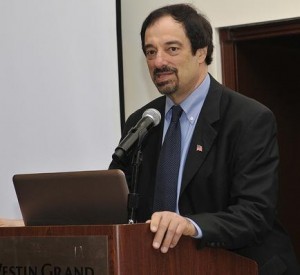Speaking at his organization’s 10th Annual Access to Capital and Telecommunications Policy conference as reported at RBR.com, Minority Media and Telecommunications Council President David Honig called for a new Telecom Act that would give even more power to the Federal Communications Commission, and called for the commission to hasten the sale of unused spectrum for broadband suppliers.
The latter proposal is one that pro-market analysts support, and Honig’s reasoning is interesting, as he argues that the spread of broadband disproportionately helps minorities:
DTV spectrum auctions [will take] probably five to seven more years, even though the FCC’s own National Broadband Plan concludes that we need 500 more megs of commercial wireless spectrum right now to forestall large market spectrum exhaust and the use of price to ration demand. Imagine what spectrum exhaust would do to the ubiquity of wireless – the one technology for which minority adoption runs far ahead of everyone else primarily because wireless is so affordable – a critical factor now that the racial wealth gap has grown to 20:1 for African Americans and 18:1 for Hispanics. Take away wireless affordability and we will have lost our best opportunity to close the digital divide.
Honig also wants the FCC to relax rules on minorities’ ownership of telecom:
Should the Commission determine why, in just the past five years, we’ve seen 30 years of progress in minority broadcast ownership virtually evaporate? An unprecedented coalition of 50 national organizations, led by MMTC, has presented 47 race-neutral and nearly unopposed proposals to advance minority broadcast ownership. Yet the FCC has failed to rule on any of them. One proposal, for modest ownership rule waivers when a company incubates a new voice, has been pending in seven dockets since the National Association of Black Owned Broadcasters introduced it in 1990. Another proposal, seeking relaxation of the FCC’s World War I – era broadcast foreign ownership restrictions, has been pending for five years even though foreign investors are eager to provide U.S. minority broadcasters with much-needed access to capital.
Honig also, however, complains that the FCC has been too inactive in recent years, and that the 1996 Telecommunications Act has stood in the way of needed government regulation of the industry. The very opposite is true: the great progress that has occurred in the telecom indistry in the past couple of decades is attributable precisely to the fact that government has not been able to keep pace with technological changes in its efforts to regulate the industry. This relative freedom has allowed the industry to grow organically and consistently provide new and better services.
In fact, the Obama FCC has been very aggressive in ramping up regulation of the industry, by blocking proposed mergers, trying to force net neutrality, and the like. These incursions into the industry are entirely wrongheaded and will suppress growth of telecom services, the very thing Honig wants.
Judging from a pro-market perspective, Honig has it half-right: the FCC and Congress should relax regulation of telecom for minority owners–and for everybody else as well. That will bring more, better, and cheaper service to minorities and others alike.
The FCC and Congress have not been as intrusive in the telecom industry as they and Honig would like to be, and that is an entirely good thing.



